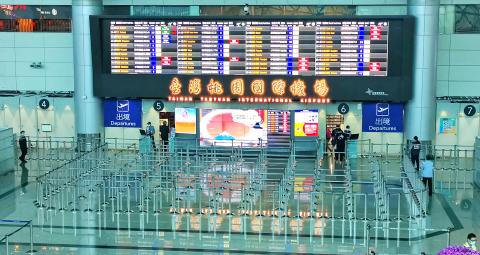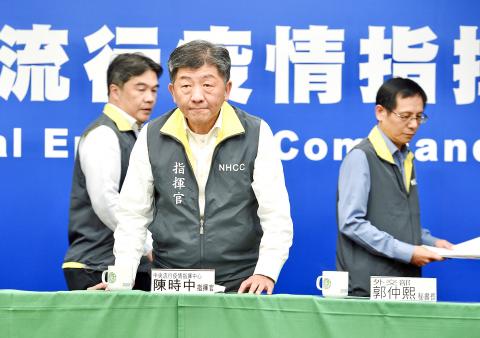The Central Epidemic Command Center (CECC) yesterday announced that Chinese minor children of Taiwanese and Chinese couples would continue to be banned from entering Taiwan.
At their regular weekly meeting yesterday, President Tsai Ing-wen (蔡英文) and Premier Su Tseng-chang (蘇貞昌) overturned a policy announced by the Mainland Affairs Council (MAC) on Tuesday that would have allowed the children entry under special conditions, the center said.
Facing a widespread outbreak of COVID-19 in China, the center announced a ban on the entry of Chinese visitors from Thursday last week, but the council initially relaxed the policy on Tuesday.

Photo: Tony Yao, Taipei Times
Minister of Health and Welfare Chen Shih-chung (陳時中), who heads the center, yesterday told a news conference in Taipei: “We are revoking all the control measures allowing Chinese minor children of Taiwanese and Chinese couples to return to Taiwan announced by the MAC on Tuesday.”
“Chinese children of Taiwanese and Chinese couples who do not have nationality of our country and are still in China, Hong Kong or Macau will not be allowed to enter Taiwan,” he said.
The MAC had announced that the exception would allow Chinese minor children of Taiwanese and Chinese couples who have an Alien Resident Certificate or a long-term visa for visiting family or relatives to enter Taiwan, but they would be placed in home quarantine for 14 days after arrival.

Photo: Peter Lo, Taipei Times
The announcement quickly sparked public confusion and criticism, with the MAC on Tuesday night saying that the policy had been narrowed to only include Chinese children who are under 18 years old, “have been living in Taiwan” and “have no one to take care of them in China,” adding that they must apply for entry and gain approval from the National Immigration Agency.
Chen yesterday said that anyone who is in Taiwan would receive equal medical treatment if they are infected, and anyone who is in home isolation or home quarantine in Taiwan would also be regulated equally.
“However, there must be a differentiation at border controls and priority is given to Taiwanese,” he said.
Many Taiwanese in China are likely to return for the Tomb Sweeping Day holiday, so the center is worried that loosening border controls would cause a capacity shortage, he added.
About 5,000 people are placed in home quarantine every day and as quarantines last 14 days, there would be more than 70,000 people in home quarantine every day and more people are needed to monitor them, Chen said.
COVID-19 testing capacity has increased to about 1,010 people per day, but two test results are required to confirm each case and about 40 percent of the nation’s 1,100 negative pressure isolation rooms are being used, so some capacity must be reserved for possible emergency situations, he said.
“We know there is kinship between Chinese minor children and their Taiwanese parents, but our principle is to put Taiwanese first,” Chen said. “There are already many problems to deal with among Taiwanese, such as those who are ill, but stranded in Wuhan [the epicenter of the outbreak in China]… Emergency rescue operations could be needed at any time.”
“We will not allow our medical and related capacity to be used on non-Taiwanese. Of course, we hope to help others if we have spare capacity, but the CECC will have failed in its duty if we cannot act within our power,” he said.
Chinese minor children of Taiwanese and Chinese couples could not have been left alone in China without caregivers, as their parents must have made arrangement for them before returning to Taiwan, Chen said.
“Moreover, they [parents] had the option to choose their nationality in the first place, but they did not choose Taiwan, so they must make proper arrangements for themselves and bear the consequences now,” he said.

INVESTIGATION: The case is the latest instance of a DPP figure being implicated in an espionage network accused of allegedly leaking information to Chinese intelligence Democratic Progressive Party (DPP) member Ho Jen-chieh (何仁傑) was detained and held incommunicado yesterday on suspicion of spying for China during his tenure as assistant to then-minister of foreign affairs Joseph Wu (吳釗燮). The Taipei District Prosecutors’ Office said Ho was implicated during its investigation into alleged spying activities by former Presidential Office consultant Wu Shang-yu (吳尚雨). Prosecutors said there is reason to believe Ho breached the National Security Act (國家安全法) by leaking classified Ministry of Foreign Affairs information to Chinese intelligence. Following interrogation, prosecutors petitioned the Taipei District Court to detain Ho, citing concerns over potential collusion or tampering of evidence. The

NEGOTIATIONS: The US response to the countermeasures and plans Taiwan presented has been positive, including boosting procurement and investment, the president said Taiwan is included in the first group for trade negotiations with the US, President William Lai (賴清德) said yesterday, as he seeks to shield Taiwanese exporters from a 32 percent tariff. In Washington, US Trade Representative Jamieson Greer said in an interview on Fox News on Thursday that he would speak to his Taiwanese and Israeli counterparts yesterday about tariffs after holding a long discussion with the Vietnamese earlier. US President Donald Trump on Wednesday postponed punishing levies on multiple trade partners, including Taiwan, for three months after trillions of US dollars were wiped off global markets. He has maintained a 10 percent

TRADE: The premier pledged safeguards on ‘Made in Taiwan’ labeling, anti-dumping measures and stricter export controls to strengthen its position in trade talks Products labeled “made in Taiwan” must be genuinely made in Taiwan, Premier Cho Jung-tai (卓榮泰) said yesterday, vowing to enforce strict safeguards against “origin laundering” and initiate anti-dumping investigations to prevent China dumping its products in Taiwan. Cho made the remarks in a discussion session with representatives from industries in Kaohsiung. In response to the US government’s recent announcement of “reciprocal” tariffs on its trading partners, President William Lai (賴清德) and Cho last week began a series of consultations with industry leaders nationwide to gather feedback and address concerns. Taiwanese and US officials held a videoconference on Friday evening to discuss the

PERSONAL DATA: The implicated KMT members allegedly compiled their petitions by copying names from party lists without the consent of the people concerned Judicial authorities searched six locations yesterday and questioned six people, including one elderly Chinese Nationalist Party (KMT) member and five KMT Youth League associates, about alleged signature forgery and fraud relating to their recall efforts against two Democratic Progressive Party (DPP) legislators. After launching a probe into alleged signature forgery and related fraud in the KMT’s recall effort, prosecutors received a number of complaints, including about one petition that had 1,748 signatures of voters whose family members said they had already passed away, and also voters who said they did not approve the use of their name, Taipei Deputy Chief Prosecutor